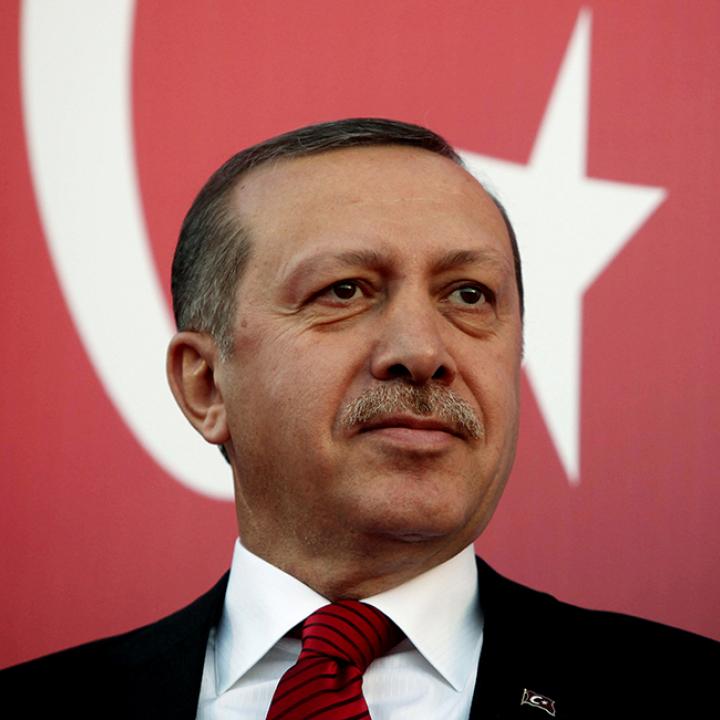

An expert conversation on the pitfalls and potential areas of cooperation between Washington and Ankara in the coming years.
On April 16, The Washington Institute held a virtual Policy Form with Soner Cagaptay, Asli Aydintasbas, Max Hoffman, and Jenny White. Cagaptay is the Institute’s Beyer Family Fellow and author of its recently released Transition 2021 memo “Defining a Realistic Policy Toward Erdogan’s Turkey: Advice for the Biden Administration.” Aydintasbas is a senior fellow at the European Council on Foreign Relations. Hoffman is director of national security and international policy at the Center for American Progress. White is a professor, writer, and social anthropologist based at Stockholm University’s Institute for Turkish Studies. The following is a rapporteur’s summary of their remarks.
Soner Cagaptay
The United States and Turkey have a seven-decade relationship that is currently in a rough patch. The two most significant friction points are Ankara’s purchase of Russian S-400 missile systems and Washington’s cooperation with the Kurdish People’s Defense Units (YPG) in Syria.
The S-400 purchase is representative of the gradually deepening ties between President Recep Tayyip Erdogan and his Russian counterpart, Vladimir Putin, which date back to Moscow’s quick offers of support following the 2016 coup attempt against Erdogan. In exchange, Ankara agreed to purchase the S-400 and later accepted delivery of the system—which Washington views as a violation of Turkey’s NATO commitments.
Regarding U.S. cooperation with the YPG, Erdogan objects to the partnership given the group’s connection to the Kurdistan Workers Party (PKK), a Turkish organization that Ankara, Washington, and other NATO members have designated as a terrorist entity. Unfortunately, neither of these bilateral challenges is likely to be resolved—Russia maintains significant economic and military leverage over Turkey, and the United States has shown no interest in bringing its partnership with the YPG to an end.
Even so, the two countries still share many areas of cooperation. Turkey has soft power in Afghanistan and can serve as an effective mediator there. It has also pushed back against Russian aggression in Ukraine and Libya, further aligning with U.S. interests. If Ankara takes a more critical line against China, especially regarding Beijing’s treatment of Uyghur Muslims, the Biden administration may be inclined to overlook the points of bilateral disagreement. Yet this possibility is complicated by Turkey’s dependence on China for vaccines and potential infrastructure investment.
Domestic political pressures will affect the relationship as well. Erdogan’s popular support is at its lowest point since he was elected prime minister way back in 2002, years before he transformed the country into an executive system of government. The economic growth that once boosted his numbers has evaporated, and his tendency to blame current national problems on twentieth-century elites fails to resonate with younger voters. Moreover, the 2018 switch to a presidential system solidified the opposition, making it more difficult for him to drive a wedge between its factions. If his party struggles in the next election as much as it has in recent ones, he may turn to increasingly oppressive measures, and perhaps claim that the vote is rigged if he should happen to lose. In that scenario, the Biden administration may eventually be forced to choose between Erdogan and democracy.
To move forward, Washington and Ankara need to isolate the intractable S-400 and YPG issues and refocus on deepening institutional engagement in areas of shared interest. The Biden administration should also leverage America’s deep economic ties with Europe and help preserve a place for civil society and political opposition. The challenge is to keep Turkey’s democracy vibrant while Erdogan remains on the scene.
Asli Aydintasbas
Turkey has embraced strategic autonomy, ensuring that its future under Erdogan will not be shaped solely by relations with the United States or Russia. Accordingly, Washington should adopt a more realistic posture, embracing areas of cooperation (e.g., Iraq and Ukraine) while better managing differences and recognizing the relationship’s limitations.
Turkey’s democratic backsliding can be reversed. There is domestic demand for a return to democracy, and Erdogan is a pragmatist who could decide to go along with this sentiment if it suits his interests. The economy is in its worst shape since he rose to power nearly two decades ago, creating wide swaths of disaffected voters. The situation might also push him to embrace the United States and Europe given their deep economic ties. Ultimately, the question of whether Biden will be forced to choose between Erdogan and Turkish democracy may depend on how deep these grievances run in the electorate.
Max Hoffman
The bilateral relationship has fallen into an uncomfortable stasis defined by transactionalism. Erdogan may be interested in charming Biden, but a Turkish reset is clearly low on the White House’s list of priorities. Rather, Washington is signaling that it prefers institutional ties over the more personal ties that developed during the Trump administration. U.S. officials would be happy just to get to Turkey’s next election in 2023 without a major bilateral incident.
For his part, Erdogan enjoys the independence that a transactional relationship grants him, and he understands that the two countries are unlikely to resolve all of their disagreements in a comprehensive deal. At the same time, his expectation of concessions in certain instances shows his understanding that U.S.-Turkish ties are still based on the old strategic partnership.
The Trump administration’s relative uninterest in the Middle East enabled Erdogan’s embrace of strategic autonomy, but the Biden administration has brought a different approach driven by pro-democracy, anti-autocracy rhetoric, reflecting the president’s worldview. Erdogan’s domestic support is being eroded by challenges such as refugees, the economy, and his long-term incumbency. Turkish democracy is resilient enough to resist if he attempts to steal an election that he definitively lost, but the United States must consider how it will respond if he takes serious anti-democratic steps.
Jenny White
When Erdogan speaks about international affairs, he frames Turkey as either a powerful international actor or a victim of external aggressors. President Biden’s decision to delay telephoning him since inauguration registers somewhere between these poles, demonstrating the new administration’s priorities while denying the Turkish leader a political win. This lack of top-level communication sends another message as well—that Ankara does not yet have a clear place in Washington’s new foreign policy, which puts a premium on the domestic benefits of international actions.
As long as Erdogan remains in power, the United States will need to consider how it can push back against his anti-democratic leanings without damaging the country as a whole. For instance, broad sanctions hurt the Turkish people and confirm Erdogan’s rhetoric, while court cases targeting his inner circle can have a greater impact with less collateral damage.
For now, full democracy poses a substantial risk to Erdogan’s hold on power, so he seems to believe that the only way to stay in office is through further oppression of those who oppose him. Turkey still has a robust civil society that supports democracy, but most of the major opposition organizations have fled underground or been coopted by the government. If Washington and the European Union try to help these groups, they run the risk of feeding into Erdogan’s victimization narratives, since “foreign influence” is a particular concern of his. The proliferation of well-organized, pro-Erdogan armed groups further complicates the path to restoring full democracy.
This summary was prepared by Henry Mihm. The Policy Forum series is made possible through the generosity of the Florence and Robert Kaufman Family.





